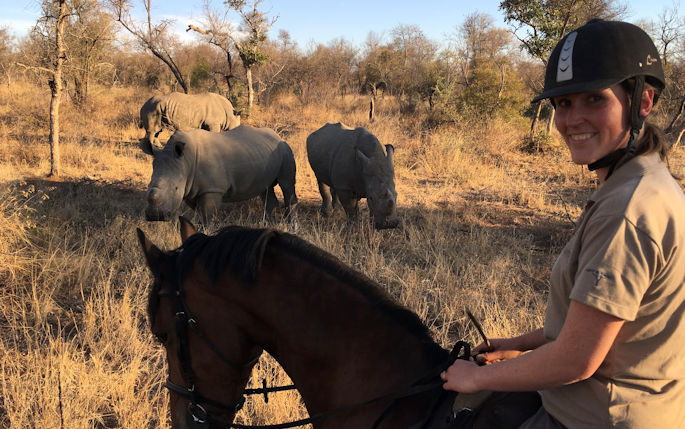Alumna sets up Equine Anti-Poaching organisation in South Africa

Liverpool alumna, Danielle Jackson (BVSc 2014), first visited South Africa following a Vets Go Wild trip in 2012 where she spent time at Ikhala Veterinary Wildlife Services in the Eastern Cape. During that time, Danielle fell in love with the country and, after graduation, she joined the same company for a six month internship. Throughout her internship, she was involved in conservation and monitoring wildlife during darting procedures. It was also during this time that the idea for the Equine Anti-Poaching Unit started to develop.
Following her internship, Danielle was offered a permanent position at Ikhala and became the sole vet in charge of a 10,000 hectare reserve. Danielle was the wildlife manager and her fiancé was the ecologist. Between them and their team, they monitored breeding camps, carried out procedures such as attaching tracking collars, monitored animals for pregnancy and moved animals to other reserves to maintain the genetic diversity and ecological balance of a species. They were also frequently involved in the post mortem and forensic examination of rhinos that had been poached. Danielle explained that: “The desperateness of the poaching crisis is very hard to ignore when you have seen it first-hand”.
The Equine Anti-Poaching Unit was borne from a discussion of using horses to carry out patrols, not dissimilar to mounted police. The Unit works under the umbrella of another South African, non-governmental organisation, the African Rhino Conservation Centre, a network created to co-ordinate the battle against the destruction of the Eastern Cape's rhino population.
Horses offer a number of advantages over foot or vehicle patrols: you have 360o vision, are higher up, and you travel faster than a foot patrol but can go places a vehicle patrol cannot. Danielle describes the horses as “the ultimate 4x4”. The horses used tend to be small, strong steady endurance horses who are sensible enough to teach the rangers to ride but also sensitive enough to be trained not to run from the wildlife in the reserve. Importantly the wildlife are also very receptive to having the horses moving amongst them.
A pilot project initially ran for 12 months on a private reserve in the Eastern Cape and was the first of its kind in that area. An existing unit and its protocols were combined with horses. The bond created between ranger and horse helped to strengthen the Unit’s current capabilities and hopefully reduced the likelihood of poaching. The pilot was a great success and Danielle recently oversaw the successful handover of this unit to the reserve. Although she will continue to support from the side-lines and provide maintenance funding.
Danielle is currently fundraising on a small scale with a view to setting up a similar project on another reserve in the same area. The idea of the projects is to keep them extensive and low cost, it would be very easy to lose sight of the ultimate goal of protecting the rhinos. Danielle described the units as “a small change that has a big impact on the ground.”
Have you done something remarkable since your time at the University of Liverpool? If you have a story about your journey since graduating you can let us know via: alumni@liverpool.ac.uk.